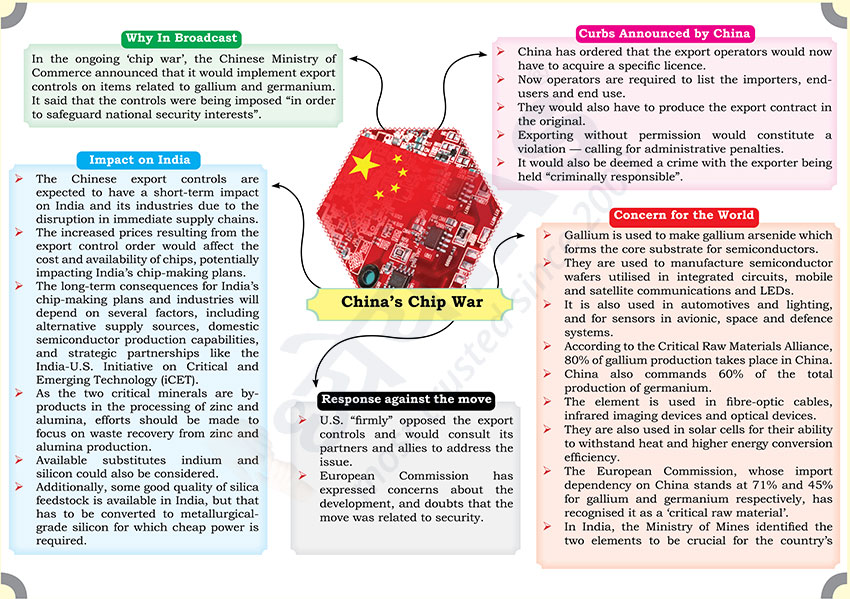Brain-booster
/
30 Jul 2023
Brain Booster for UPSC & State PCS Examination (Topic: China’s Chip War)

Why in Broadcast?
- In the ongoing ‘chip war’, the Chinese Ministry of Commerce announced
that it would implement export controls on items related to gallium and
germanium. It said that the controls were being imposed “in order to
safeguard national security interests”.
Curbs Announced by China
- China has ordered that the export operators would now have to acquire a
specific licence.
- Now operators are required to list the importers, endusers and end use.
- They would also have to produce the export contract in the original.
- Exporting without permission would constitute a violation — calling for
administrative penalties.
- It would also be deemed a crime with the exporter being held “criminally
responsible”.
Concern for the World
- Gallium is used to make gallium arsenide which forms the core substrate
for semiconductors.
- They are used to manufacture semiconductor wafers utilised in integrated
circuits, mobile and satellite communications and LEDs.
- It is also used in automotives and lighting, and for sensors in avionic,
space and defence systems.
- According to the Critical Raw Materials Alliance, 80% of gallium
production takes place in China.
- China also commands 60% of the total production of germanium.
- The element is used in fibre-optic cables, infrared imaging devices and
optical devices.
- They are also used in solar cells for their ability to withstand heat
and higher energy conversion efficiency.
- The European Commission, whose import dependency on China stands at 71%
and 45% for gallium and germanium respectively, has recognised it as a
‘critical raw material’.
- In India, the Ministry of Mines identified the two elements to be
crucial for the country’s
Response against the move
- U.S. “firmly” opposed the export controls and would consult its partners
and allies to address the issue.
- European Commission has expressed concerns about the development, and
doubts that the move was related to security.
Impact on India
- The Chinese export controls are expected to have a short-term impact on
India and its industries due to the disruption in immediate supply chains.
- The increased prices resulting from the export control order would
affect the cost and availability of chips, potentially impacting India’s
chip-making plans.
- The long-term consequences for India’s chip-making plans and industries
will depend on several factors, including alternative supply sources,
domestic semiconductor production capabilities, and strategic partnerships
like the India-U.S. Initiative on Critical and Emerging Technology (iCET).
- As the two critical minerals are byproducts in the processing of zinc
and alumina, efforts should be made to focus on waste recovery from zinc and
alumina production.
- Available substitutes indium and silicon could also be considered.
- Additionally, some good quality of silica feedstock is available in
India, but that has to be converted to metallurgicalgrade silicon for which
cheap power is required.







